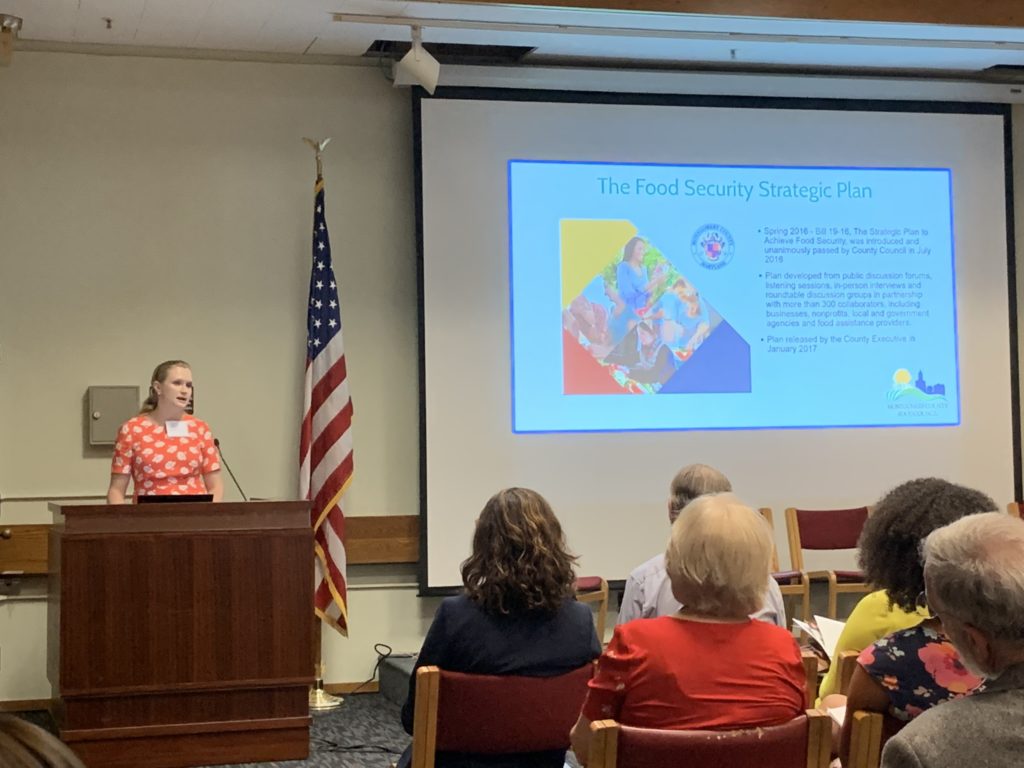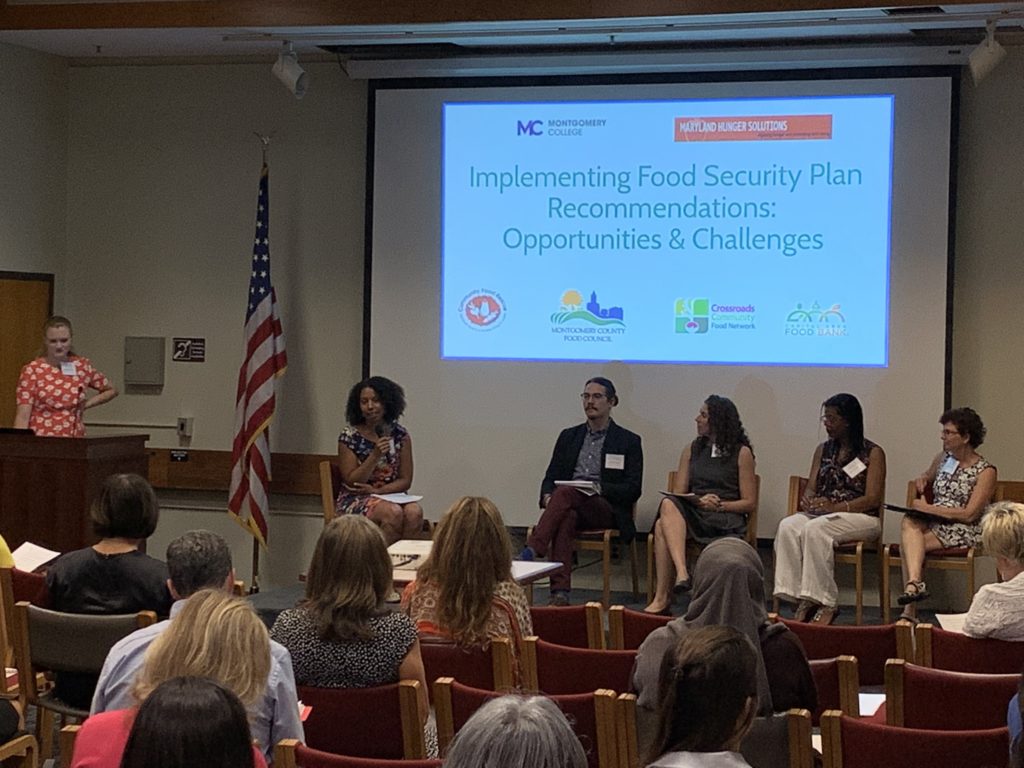Many of our neighbors are deeply entrenched in poverty, and over 60,000 of them are unsure of where or when they will get their next meal. The Montgomery County Food Security Plan is the blueprint for how every local business, nonprofit, government agency and resident can contribute to ensuring all County residents have access to sufficient, nutritious food.
The Food Security Plan, released in January 2017, outlines extensive strategies for reducing the number of food insecure individuals in the County by 22% by the year 2020. The Montgomery County Food Council, the Department of Health and Human Services, and many community nonprofit, business, and agency partners, have been working diligently to implement the Food Security Plan’s recommendations.
Click the links below to skip to:
2019 Food Security Plan Community Update
Food Security Plan Recommendations for Years Two and Three
Background on the Creation of the Food Security Plan

The Montgomery County Food Council (MCFC) and the Montgomery County Department of Health and Human Services co-hosted a successful Food Security Plan Community Update on Friday, June 28, 2019, attended by nearly 100 food security stakeholders and community partners. The event featured a welcome from MCFC Board Chair Sharon Feuer Gruber, a greeting from County Executive Marc Elrich, as well as presentations from Dr. Travis Gayles, Montgomery County Health Officer and Chief of Public Health Services, Amanda Nesher, the MCFC Food Security Programs Manager, Rhona Reiss, MCFC Food Security Plan Community Advisory Board Member, and Thomas Tippett, Performance Management Analyst at CountyStat.
 Presenters shared an update on the Food Security Plan implementation efforts to date, new data accessible through FoodStat and the impact of FoodStat on Food Assistance Services in the County, recent policy and advocacy efforts related to food security at the County and State level, and next steps for addressing the recommendations in Years 3, 4, and 5 of the Plan. The event also included a panel discussion on “Implementing Food Security Plan Recommendations: Opportunities & Challenges.” This panel covered a variety of topics, including expanding access to benefits programs, increasing the availability of culturally appropriate food, combatting food insecurity amongst college students, and expanding food recovery efforts.
Presenters shared an update on the Food Security Plan implementation efforts to date, new data accessible through FoodStat and the impact of FoodStat on Food Assistance Services in the County, recent policy and advocacy efforts related to food security at the County and State level, and next steps for addressing the recommendations in Years 3, 4, and 5 of the Plan. The event also included a panel discussion on “Implementing Food Security Plan Recommendations: Opportunities & Challenges.” This panel covered a variety of topics, including expanding access to benefits programs, increasing the availability of culturally appropriate food, combatting food insecurity amongst college students, and expanding food recovery efforts.
 Please click to view the presentation slides and the handout presented at the Update (the FoodStat interactive data tool can be accessed here). In addition, MyMCMedia produced a Spanish-language segment about the event which can be found here.
Please click to view the presentation slides and the handout presented at the Update (the FoodStat interactive data tool can be accessed here). In addition, MyMCMedia produced a Spanish-language segment about the event which can be found here.
In Year 3, the Food Council, with the help of its Working Groups and partner organizations, plans to build upon the activities undertaken in Years 1 and 2 of the Food Security Plan. Among other initiatives, we will continue to focus on strategies to increase benefits application assistance outreach and case management, and work with healthcare providers to help facilitate “screen and intervene” programs, along with appropriate sustainable referral and long-term case management mechanisms.
Recommendations:
Resources:
The Food Security Plan resulted from the passage of Bill 19-16, The Strategic Plan to Achieve Food Security, which was introduced in the Montgomery County Council by Councilmember Roger Berliner in the Spring of 2016. Sixteen hunger relief and food system organizations testified in support of this legislation at a public hearing on June 14th, 2016. The bill was passed unanimously by the County Council and the Innovation Program of Montgomery County was tasked with creating a Food Security Plan. The Food Council, as the nexus of food system work in the County, was designated as the lead nonprofit to collaborate with the Innovation Program on the researching and writing of the Plan.
To create the Plan, the Food Council employed a collaborative community engagement process that involved over 300 stakeholders, including food security professionals and County residents. An advisory committee was convened bi-weekly to guide the plan’s creation. The Food Council facilitated 6 community engagement meetings with nonprofit, government, and business representatives, and 8 listening sessions with local residents, conducted an online survey, and conducted over 40 key informant interviews. The resulting Food Security Plan reflects our shared objectives to:
In addition to the community engagement process described above, the Food Council referenced many existing food security resources to create the Plan, including:
Learn more about this comprehensive strategy to achieve our shared goal of food security for all in Montgomery County:
Summary of the Food Security Plan
Food Security Plan Year One Update
View the media coverage of the Food Security Plan:
Closer Look – Fighting Hunger in Montgomery County
Food Security Plan Combats Hunger on Local Level
Food Security Plan Aims to Tackle Hunger in Montgomery County
Nov 5